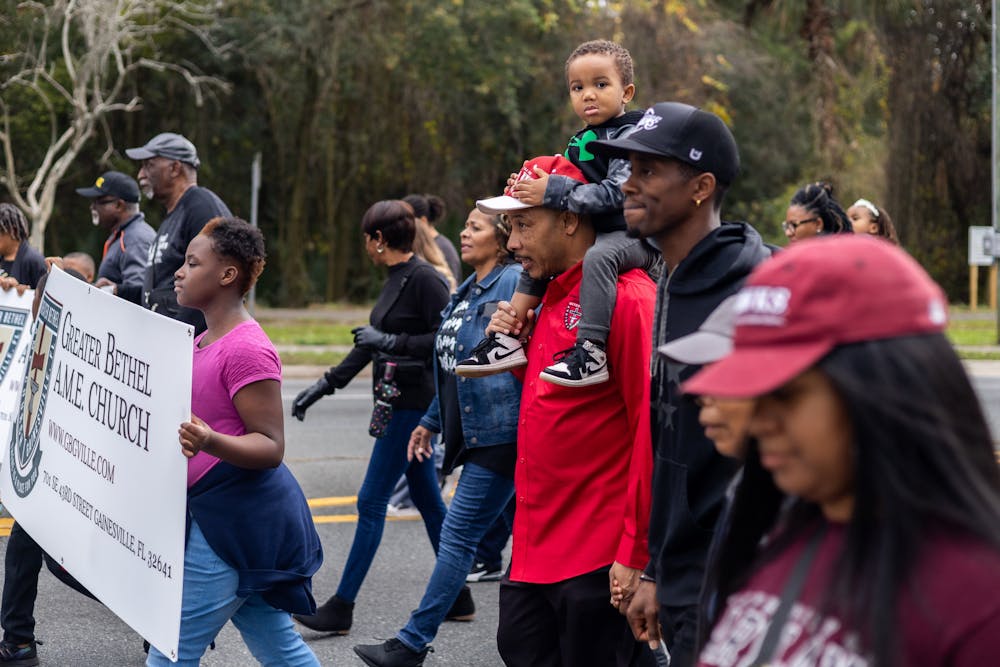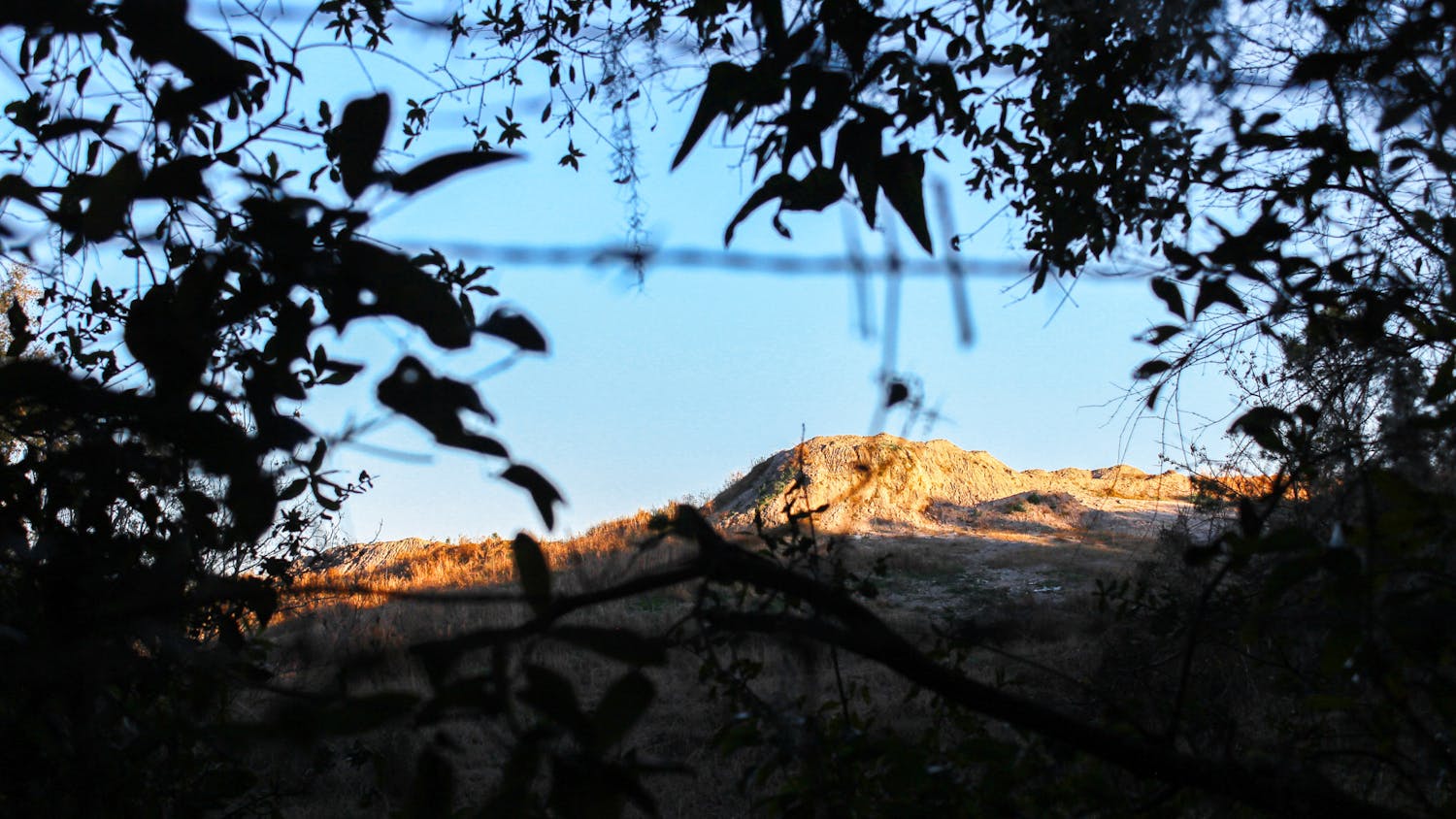Hundreds of Alachua County residents took to the streets Monday, commemorating the legacy of Martin Luther King Jr. through a series of county-wide celebrations.
Jan. 15 marked the 40th anniversary of Gainesville's celebration honoring King, and Micanopy’s first annual march. The events were filled with signs, speeches, awards and hotdogs.
MLK Day in Gainesville
Hundreds marched during a cloudy day along Martin Luther King Jr. Highway with “Black Lives Matter” shirts and a variety of signs, like “invest in Black men,” Jan. 15 in celebration of Martin Luther King Jr. Day.
Hosted by the Martin Luther King Jr. Commission of Florida, the parade started at City Hall at noon, and parade-goers walked roughly a mile to the Martin Luther King Jr. Multipurpose Community Center.
Some sang “We Shall Overcome” by Pete Seeger while the employees of Wawa, McDonalds and Waffle House watched the parade along East University Avenue.
Before the parade, the president of the commission, Rodney Long, gave a speech reciting an excerpt from a Martin Luther King Jr. speech he made the night before his death.
“Men, for years now, have been talking about war and peace. But now, no longer can they just talk about it,” King said in the 1968 speech.
The Martin Luther King Jr. Commission of Florida awarded a $10,000 scholarship to 17-year-old Justice Alexander before Long’s speech.
Alexander, student body president at Eastside High School, was awarded the Edna M. Hart Keeper of the Dream scholarship. Edna M. Hart was a member of the commission and became the first woman of color to receive a master’s degree in Alachua County in 1949.
During the application process, Alexander had to write an essay on King’s ideals.
“I wrote about how the work of Dr. King and other people allowed me to take advantage of certain opportunities and have higher aspirations,” she said.
Several groups participated in the parade, including Jewish Voice for Peace, a grassroots organization for Jewish people who are in solidarity with Palestinians during the Israel-Hamas war.
Wearing a shirt that reads “Ceasefire Now,” 42-year-old Abigail Fletcher, a member of Jewish Voice for Peace, spoke about how it’s important for people of all kinds to get together and celebrate King’s life.
“We’re here today to be in solidarity with the African American community and also to celebrate Martin Luther King Jr., who was a powerful civil rights activist and also an anti-war activist,” she said. “We believe that if he was alive today he would be against the war in Gaza.”
Rising Sun Lodge No. 10, a rising sun masonic chapter, provided free hot dogs and refreshments to anyone attending the parade.
Darryon Roberson Sr., president of the Rising Sun Lodge No. 10, expressed how much MLK’s work has impacted him and his organization.
“We still had doors that were closed, and because of Martin Luther King, and his actions, that opened the doors for us,” Roberson said. “I think that’s the greatest contribution he gave us, and we can only do anything but respect him and marching in his day.”
UF students and Gainesville residents spent the day off attending the parade and paying respect to King and his work.
Gainesville City Commissioner Casey Willits is one of the many city representatives who participated in the parade, such as Mayor Harvey Ward and City Commissioner Ed Book.
Willits has participated in the parade for six years and since then has seen the growth within the community and their willingness to learn more about national history, he said.
“What I think I see the most in the crowd is an evolution of a movement locally and also nationwide,” he said.
As a white man, Willits acknowledged the importance of being an ally and having uncomfortable conversations, especially through events like Monday’s parade.
“In Gainesville, in Florida, in the South, remembering and also challenging our perceptions of our memory of Dr. King’s work in the Civil Rights Movement and the progression to the current day is important,” Willits said.
The first Gainesville march was in 1982 and went from the Plaza of the Americas to Bo Diddley Plaza.
Micanopy march
Micanopy, on the other hand, debuted its first-ever MLK Day celebration. Bishop Christopher Stokes, the founder and executive director of the Willie Mae Stokes Community Center, was driving to Ocala last year for the city’s Martin Luther King Jr. Day celebration when he had an epiphany.
“We would always walk in the other communities, and help the other communities celebrate Dr. King,” Stokes said. “I’m driving to Ocala through Micanopy, and why not do this in Micanopy?”
A year later, his idea blossomed into Micanopy’s first annual MLK Day celebration, hosted by the Stokes Center. The celebration, honoring King and the achievements of community leaders, included a 10 a.m. march, a complimentary meal of hot dogs and hamburgers, a program of speakers headlined by County Commissioner Charles “Chuck” Chestnut IV and the awarding of Micanopy’s first annual Hometown Hero Award.
Close to 100 Micanopians joined the march, trekking from the center’s 355 NW Eestalustee Ave. address, turning under the live oak canopy of N Division St., before looping back on NW Seminary Ave., toward Eestalustee and the welcome faces of the center’s hand-painted murals.
During the parade, marchers clapped and sang along with the gospel songs playing from the speakers of the four-wheeler leading the procession.
Upon returning, the group gathered with hot dogs in hand on the center’s basketball court, dressed with folding chairs and a podium in preparation for the day’s program of speakers.
Stokes welcomed the program and Jiana Williams, the first female African American mayor of Micanopy, followed.
“Everyone came with different reasons and convictions,” Williams said. “But we came with one common goal, and that was unity.”
County Commissioner Charles Chestnut IV spoke later as the keynote, honoring King’s legacy, but stressing that the fight is not over.
“In the past few years, state legislators have turned back the hands of time, and passed laws that prevent teachers from actively teaching history to students or not teaching Black history at all. As well as banning certain black authors and their books in the public school system,” Chestnut said.
Chestnut left the audience with a call to action to fight voter suppression laws that still impact Black voters, he said.
“My question to you is what are you going to do to stop these racist, [suppression] attacks on voters of color?” he asked.
The program ended with Chester Dunmore receiving the Hometown Hero Award. Dunmore, 86, was Micanopy’s first African American mayor and the owner of community staple Dunmore Burgers.
The award is the first of many, Bishop Christopher Stokes said, as he is already recruiting members for Micanopy’s Martin Luther King Commission, to help organize next year’s celebration, and to select the next recipient of the Hometown Hero award.
“There are other Mr. Dunmore’s in our community that have done well, and done things behind the scenes,” Stokes said. “And we stand on those shoulders. We have to start remembering our past because we didn’t just get here on our own.”
Contact Henry DeAngelis, Jordan Ramos and Emma Parker at hdeangelis@alligator.org, jramos@alligator.org and eparker@alligator.org. Follow them on X @hadeangelis, @JordanR68971799 and @emmaparkerg.
Jordan Ramos is a fourth-year journalism major who spends his time singing in two different choirs and his a cappella group.
Henry DeAngelis is a third-year journalism major and the City and County Commission reporter for the Alligator. In his free time, you can find him on the basketball court or deep in a good book.






